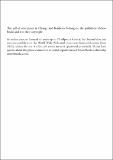Files in this item
Islands and resilience : Christianization processes in the Cyclades
Item metadata
| dc.contributor.author | Sweetman, Rebecca Jane | |
| dc.contributor.editor | Ontiveros, Miguel Ángel Cau | |
| dc.contributor.editor | Florit, Catalina Mas | |
| dc.date.accessioned | 2022-06-24T23:36:35Z | |
| dc.date.available | 2022-06-24T23:36:35Z | |
| dc.date.issued | 2019 | |
| dc.identifier | 261104946 | |
| dc.identifier | c631025d-a8c8-4643-8f28-56c51a869333 | |
| dc.identifier.citation | Sweetman , R J 2019 , Islands and resilience : Christianization processes in the Cyclades . in M Á C Ontiveros & C M Florit (eds) , Change and Resilience : The Occupation of Mediterranean Islands in Late Antiquity . Joukowsky Institute Publication , vol. 9 , Oxbow , Philadelphia , pp. 193-216 . https://doi.org/10.2307/j.ctvjsf3rt.15 | en |
| dc.identifier.isbn | 9781789251807 | |
| dc.identifier.isbn | 9781789251814 | |
| dc.identifier.isbn | 9781789251838 | |
| dc.identifier.other | ORCID: /0000-0003-2012-1021/work/61622180 | |
| dc.identifier.uri | https://hdl.handle.net/10023/25563 | |
| dc.description.abstract | Commonly perceived as pawns in wider imperial machinations, the Cyclades have often been side-lined as peripheral due to their assumed seclusion. Conversely, even a brief analysis of the archaeological evidence indicates that these islands had groups of resident Christian communities, and experienced the monumentalized manifestation of Christianity, much earlier than their mainland counterparts to the west. To establish why this is the case, it is necessary to shed the bias of preconceived notions of insularity. In so doing, this allows identification of the significant variety of communication networks that the islands had. Evidence of Christianization is seen in the spread of churches throughout the islands. The earliest churches were founded through strategic or organic processes; that is to say as a consequence of, for example, imperial or ecclesiastical intentionality, or as indirect results of contact through movement of people for purposes such as trade or craft. As such, it represents processes of complexity. Furthermore, it is suggested that a natural resilience of the islands meant that the impact of Christianity was minimal on daily life. | |
| dc.format.extent | 3974927 | |
| dc.language.iso | eng | |
| dc.publisher | Oxbow | |
| dc.relation.ispartof | Change and Resilience | en |
| dc.relation.ispartofseries | Joukowsky Institute Publication | en |
| dc.subject | CC Archaeology | en |
| dc.subject | D051 Ancient History | en |
| dc.subject.lcc | CC | en |
| dc.subject.lcc | D051 | en |
| dc.title | Islands and resilience : Christianization processes in the Cyclades | en |
| dc.type | Book item | en |
| dc.contributor.institution | University of St Andrews. Centre for Ancient Environmental Studies | en |
| dc.contributor.institution | University of St Andrews. St Andrews Institute of Medieval Studies | en |
| dc.contributor.institution | University of St Andrews. Museums, Galleries and Collections Institute | en |
| dc.contributor.institution | University of St Andrews. School of Classics | en |
| dc.identifier.doi | https://doi.org/10.2307/j.ctvjsf3rt.15 | |
| dc.date.embargoedUntil | 2022-06-25 | |
| dc.identifier.url | https://www.oxbowbooks.com/oxbow/change-and-resilience.html | en |
This item appears in the following Collection(s)
Items in the St Andrews Research Repository are protected by copyright, with all rights reserved, unless otherwise indicated.

